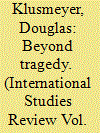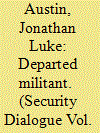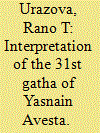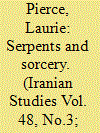| Srl | Item |
| 1 |
ID:
058826


|
|
|
| 2 |
ID:
089262


|
|
|
|
|
| Publication |
2009.
|
| Summary/Abstract |
Hans Morgenthau claimed that a tragic perspective enables us to confront more squarely the harsh realities of politics, the evil aspects of human nature, and the ethical compromises action requires. Richard Lebow has more recently identified Morgenthau as an exemplar in making his own case for the "tragic vision." This essay contrasts the sharp differences between Morgenthau's and Hannah Arendt's response to the Holocaust to challenge Morgenthau's claim, and to illustrate the limitations of a tragic perspective. Her turn to law in confronting the problems of evil and responsibility that the Holocaust had so radically posed underscores the need to draw upon other conceptual resources beyond tragedy in our critical engagement with such issues.
|
|
|
|
|
|
|
|
|
|
|
|
|
|
|
|
| 3 |
ID:
175367


|
|
|
|
|
| Summary/Abstract |
This is an essay about the personhood of militant violence, the phenomenological underpinnings of political evil and the friendship between two men. It begins by recounting the author’s street-side meeting with several Islamist militants in Tripoli, Lebanon, one of whom later described his preparations to become a ‘martyr’ in Syria. The essay takes my conversations with this man and his friends as a means of exploring the becoming of violent militancy as a fundamentally creative and essentially joyful series of encounters that lead to the emergence of extreme violence. To do so, I read the narrative account at the centre of the essay through the concept of social and political ‘fracturing’, which is described as the process through which individuals or groups are able to transcend traditional limits on knowledge, action and belief. This discussion of social and political fracturing is then brought into conversation with the question of what constitutes social or political evil in order to demonstrate that debates over what produces violent militant mobilization have generally missed the crucial relevance of a set of small, intimate and embodied rituals that suffuse evil, violence and war-fighting more generally with a fundamentally positive (yet eventually destructive) phenomenology.
|
|
|
|
|
|
|
|
|
|
|
|
|
|
|
|
| 4 |
ID:
101662


|
|
|
| 5 |
ID:
151330


|
|
|
| 6 |
ID:
137388


|
|
|
|
|
| Summary/Abstract |
The demonic plays an integral role in the Shahnameh, manifesting itself in countless forms. Early kings and heroes fight demons at every turn, and in one of the most memorable tales in the poem—the story of Zahhāk—Iran itself falls under the rule of demonic forces. But demons are not always physical creatures; we also encounter them as immaterial forces of temptation, distraction, and fate. One of the most fascinating aspects of this multifarious presentation of the demonic is the way it intersects the poem's portrayal of what it means to be human. This article focuses on that intersection, highlighting encounters between human beings and the demonic and arguing that they not only complicate notions of humanity, but also construct and reinforce categories of masculinity and femininity. A close examination of two phenomena at the heart of human–demon contact—serpents and sorcery—reveals how evil is embodied and enacted in highly gendered ways. Male and female characters in the Shahnameh diverge in their abilities to combat the demonic and are lured into wickedness by different means. What emerges from the interplay between human beings and demons and between the categories of masculinity, femininity, and the demonic is a multifaceted and sophisticated portrayal of evil that informs even the simplest and most straightforward tales in Ferdowsi's work.
|
|
|
|
|
|
|
|
|
|
|
|
|
|
|
|